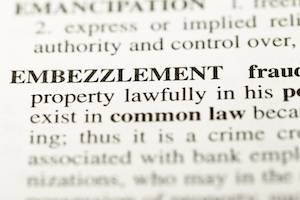What Is Embezzlement? Understanding Criminal Charges in Wisconsin
 By Ray Dall’Osto
By Ray Dall’Osto
If you pay attention to the news, you will often see stories about an employee being charged with embezzlement. A common embezzlement fact pattern involves an office manager or bookkeeper who is accused of diverting their employer’s money to his personal account, often in small increments over a long period of time, or charging and purchasing personal items using the employer’s credit. Another situation involves a company officer, attorney, or trustee who diverts funds they are entrusted with for their personal use or for another, without the company’s or client’s knowledge and permission.
By the time the employer or entity detects possible impropriety and embezzlement, thousands to millions of dollars will have gone unaccounted for. A 2017 study of embezzlement cases nationally found the median loss to be at $300,000 and the average loss over $1 million.
While news outlets use the term embezzlement to describe this situation, the term embezzlement is not mentioned by that name in the Wisconsin criminal code. Instead, the crime known as embezzlement is covered under Wisconsin’s general theft statute.
Wisconsin Statute sec. 943.20 covers numerous types of thefts and unauthorized takings, which in civil law are called conversion. Subsection (1)(a) covers traditional thefts, i.e., taking someone else’s property without their consent, with the intent to permanently deprive the owner of possession. Subsections (1)(b) through (e), under which the crime commonly referred to as embezzlement falls, address the taking or using property in the following situations:
- A person intentionally uses, transfers, conceals or retains possession of funds or property entrusted to a person by virtue of their office, business, or employment, or as a trustee or bailee
- A person who has possession or custody of another person’s money or negotiable securities, instruments, papers, or other negotiable writings
- The intentional use, transfer, concealment, or possession of another person’s money, security, instrument, paper, or writing without their consent and contrary to their authority
- Converting property to one’s own use or to the use of any other person except the owner without the owner’s consent
Legal Concerns in Embezzlement Cases
Most embezzlement cases become criminal cases that are prosecuted by the State of Wisconsin, and in the case of a bank or other federally insured financial institution or interstate transactions, by the United States Attorney. Crimes of fraud and deceit are treated seriously by law enforcement and prosecutors. Another common charge which often accompanies an embezzlement charge is the unauthorized use of a person or entity’s identifying information to obtain something of value (identity theft). This is prosecutable as a felony under Wisconsin Statute sec. 943.201 and .203.
In addition to being criminally prosecuted, persons charged with Sec. 943.20 theft and conversion offenses may also be exposed to significant civil liability. This means that in addition to whatever prison time, supervision, and fines one is sentenced to in criminal court, a civil court may also order a defendant to compensate the victim of the crime for the money or assets which were stolen, converted, or used. Under Wisconsin Statute sec. 893.446, victims can be awarded treble damages above the actual loss, punitive damages, and an award of their attorneys’ and investigation fees to litigate such claims.
Contact a Milwaukee Embezzlement Defense Attorney
If you believe that you are suspected of embezzlement or conversion or are the subject of a criminal investigation, or if you have been arrested and formally charged, you should contact an experienced criminal defense attorney immediately. An experienced attorney will be able to assess the strength of the case against you and the available defenses and help you understand how to proceed with your defense strategy. Our team of Milwaukee, WI criminal defense lawyers will work with you to mount an aggressive and effective defense.
As someone suspected or accused of a crime, you have rights, according to the Wisconsin and United States Constitutions. To learn more about these rights and how our attorneys can assist with your case, call our firm at 414-271-1440.
Sources:
https://docs.legis.wisconsin.gov/statutes/statutes/943/III/20
https://www.acfe.com/
https://www.hiscox.com/documents/2017-Hiscox-Embezzlement-Study.pdf
https://ovc.ncjrs.gov/ncvrw2018/info_flyers/fact_sheets/2018NCVRW_FinancialCrime_508_QC.pdf







